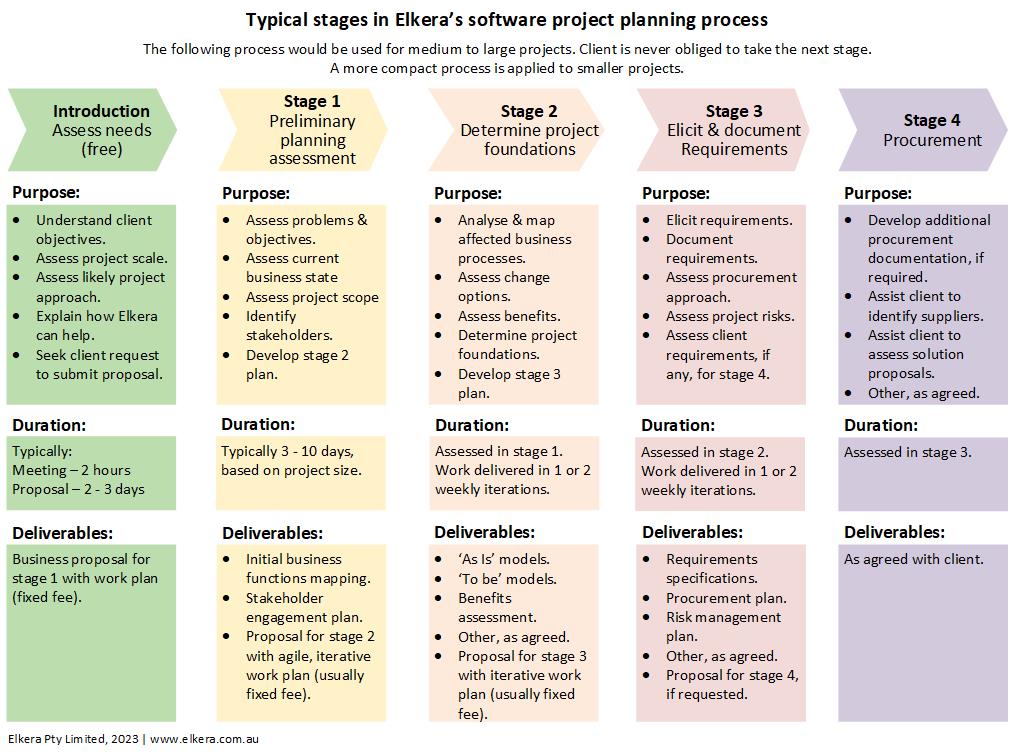Elkera’s Structured Approach for Business Process Improvement Projects
Elkera helps small and medium enterprises (SMEs) improve and automate business processes to drive increased productivity, reduce operational costs and enhance customer service. Elkera’s business consultant will analyse business processes, identify opportunities for improvement, develop a business case, elicit and define requirements, and manage solution procurement where required.
Elkera is completely independent and has no conflicting relationships with any solution providers. We never promote products or vendors. Clients always receive completely independent, objective advice.
We know you want certainty about cost and the time required to carry out your business process review project. To meet that need, Elkera has developed an approach to balance risks and provide you with the highest level of certainty. Each project is different and no one can reliably estimate the work required to complete all stages of a process improvement project until the scope and expected deliverables for the project are well understood.
To address that problem, Elkera plans its business process improvement projects in stages to minimise risk to both parties and to complete the work in the most efficient way.
The initial stages are devoted to assessing project scope so that a fixed price proposal can be provided. To begin a new client engagement, Elkera may offer to carry out a preliminary assessment with you to determine the essential elements of the proposed project and to establish that Elkera is the right consultant for you. That preliminary assessment is completely free. At the end of the preliminary assessment, Elkera will provide you with a fixed fee proposal to carry out a more detailed assessment for the main project work. You are under no obligation to proceed to the next step.
At each stage of a business process improvement or software requirements project, Elkera uses the information that is then known to produce materials that will enable reliable estimation of the work for the next stage and allow you to assess the benefits so far. If the benefits of proceeding are clear, you can take the next step. If not, you may terminate the project or we can adjust course.
Elkera’s process for medium to large business process improvement or software requirements projects is described in the diagram:
Elkera’s structured approach for medium to large business process improvement projects

Elkera’s incremental, agile delivery
Elkera uses an agile Scrum approach to complete analysis and provide deliverables in each project stage. The work defined for each stage of the project is set out in a backlog of tasks that is used to estimate the duration and cost of the work in that project stage. Selected backlog tasks are completed and delivered in fixed increments of 1-2 weeks, depending on project scale. You will never wait until the end of a project stage to see the results of the Elkera’s work with you.
The incremental, agile approach provides you with a constant stream of deliverables, so you can understand at all times how the project is proceeding.
Documentation
Each project has its own documentation requirements. Elkera places a high reliance on business process diagrams for analytical work, but software requirements for software procurement projects have to be in narrative form. To keep things moving at the lowest cost, Elkera adopts a minimalist approach to documentation. We produce only the least amount of documentation that is necessary to achieve the project objectives.
Under Elkera’s agile approach, you will receive regular deliverables of project documentation right from the first project increment.
More information about Elkera’s approach is provided in our case studies.

